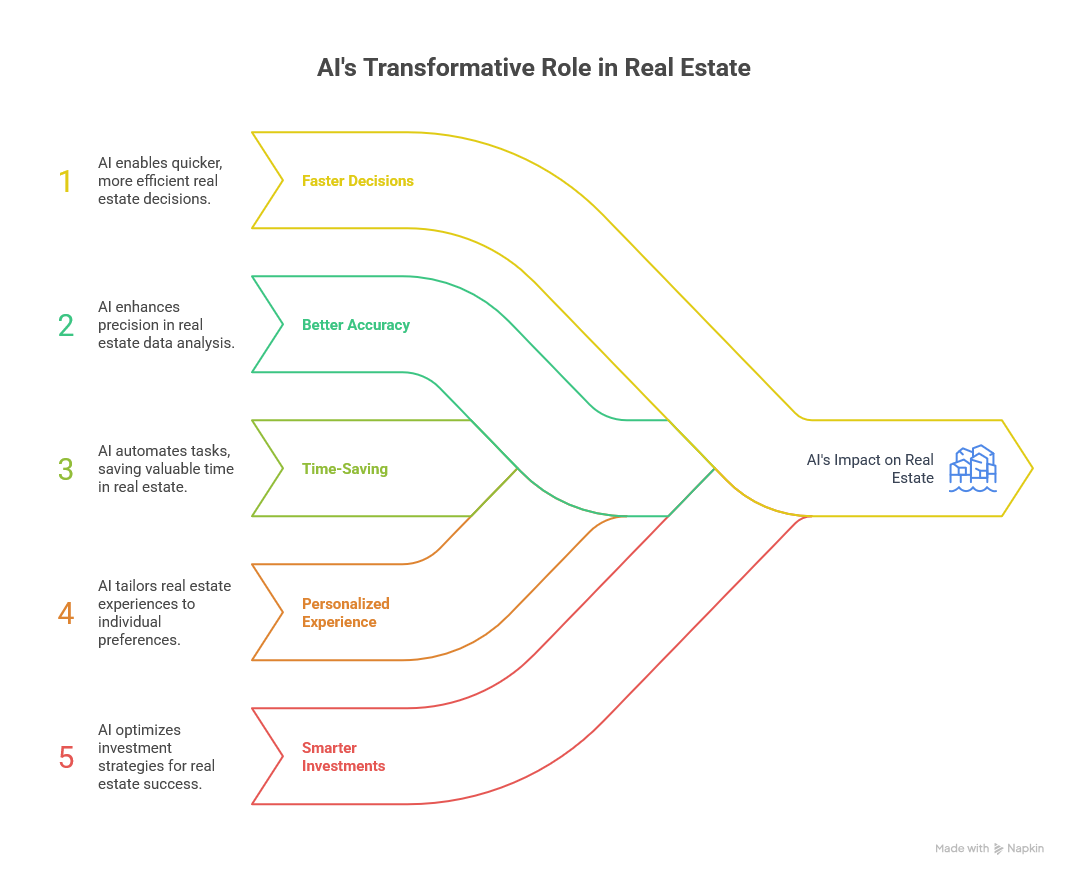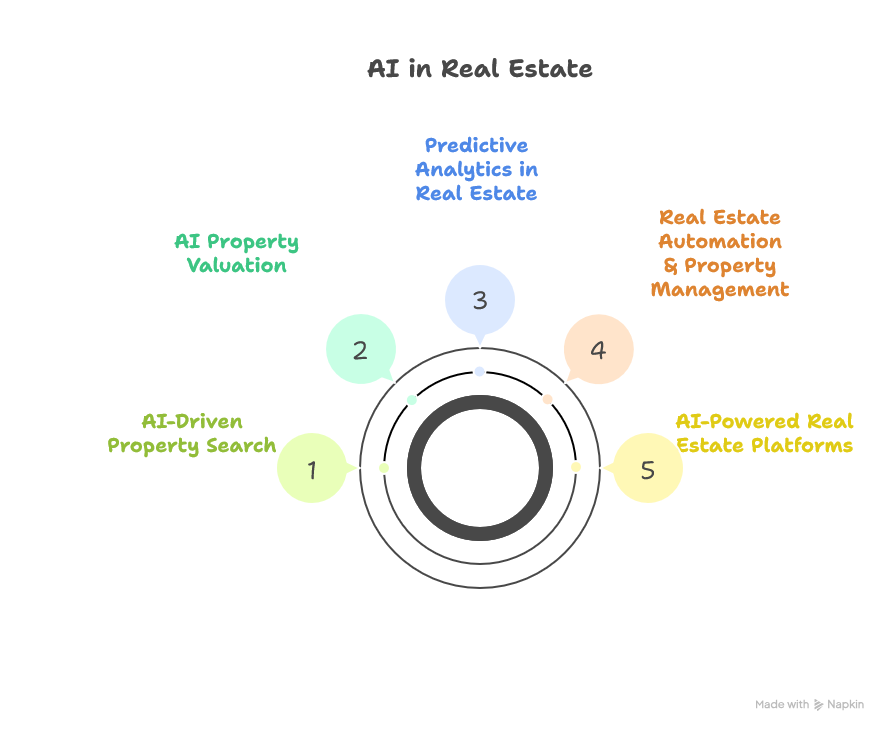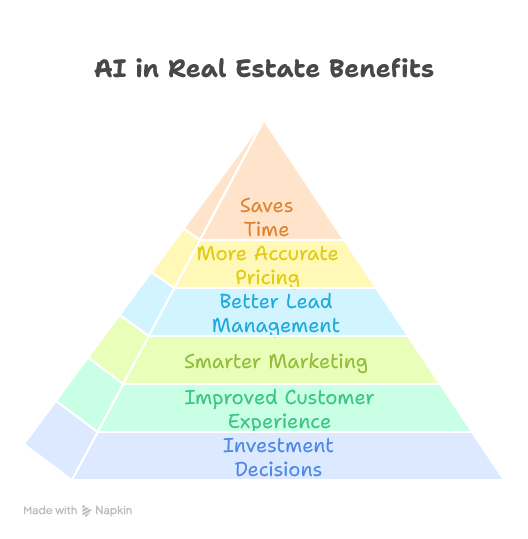
Agentive AI: The Ultimate Guide to Human-Centered Ar...
Artificial Intelligence has changed the way we interact with technolog...

The real estate world is undergoing rapid change, and AI in real estate is playing a significant role in this transformation. It’s helping buyers, sellers, agents, and investors make smarter choices with less effort and more confidence. From quicker home searches to more accurate pricing, artificial intelligence in real estate is making the entire process easier, faster, and more efficient.
Instead of guessing or spending hours on research, people can now utilize AI tools that quickly analyze large datasets and provide valuable insights. These tools can find patterns, understand what users want, and even predict if property prices will go up or down. This makes it easier to plan, compare choices, and avoid mistakes.
In simple terms, real estate AI saves time, reduces stress, and helps people make better, more informed decisions. If you’re just starting to learn about this topic, this blog is for you. It will explain what AI does in real estate, how it works, and how it can help, no matter your role in the industry.
Artificial intelligence in real estate uses smart systems, data analysis, and machine learning in real estate to make everyday tasks faster and easier. It helps with things like searching for properties, setting the right price, planning investments, and handling customer support. AI can look at a large amount of data, spot patterns, and give helpful suggestions.
It also predicts trends and helps people make better decisions with less guesswork. One of its biggest benefits is personalization. Buyers get property suggestions that match what they need, and agents or investors get insights that save time and improve results. In simple terms, real estate AI makes the process more accurate, more efficient, and easier for everyone involved.
AI is becoming a powerful part of modern real estate because of the many benefits it brings. Here are some key reasons why it’s making such a big impact on the industry:

In real estate, timing is everything. Waiting too long to act on a deal or list a property can lead to missed opportunities. That’s where AI makes a big difference.
It can quickly scan large sets of data like recent sales, buyer activity, or neighborhood trends and give clear suggestions in real-time. So, whether you’re setting a price or choosing a property to invest in, you can make faster, more confident decisions.
Speed alone isn’t enough; you also need accuracy. After all, even one pricing mistake or wrong estimate can set you back. AI uses both current and historical data to offer more accurate valuations, forecasts, and property matches.
This helps sellers avoid overpricing, buyers avoid overpaying, and agents offer data-backed advice. With AI, decisions aren’t just faster, they’re smarter and more reliable.
When accuracy and automation work together, they help save a lot of time. Real estate involves many small tasks like updating listings, replying to messages, setting up showings, and following up with leads. AI can handle many of these jobs on its own. This means agents can spend more time helping their clients, and buyers and sellers can move through the process faster and with less stress.
Since the real estate market is expected to reach $1803.45 billion by 2030, the need for smart, time-saving tools like AI is only going to grow. It’s not just about working faster; it’s about keeping up in a busy and growing industry.
AI adds a personal touch to the real estate journey by learning how users interact with listings, what they search, click on, and save. Over time, it begins to understand what each person is looking for.
Instead of offering generic results, AI suggests properties that closely match individual needs, whether it’s a quiet neighborhood, a family-friendly home, or a high-return rental. This leads to a better experience that feels more relevant, efficient, and enjoyable for every user.
Everything above speed, accuracy, saved time, and personalization leads to better investments. AI helps investors study future trends, rental demand, local development, and other key data points.
It turns raw information into useful insights, so investors can make smart choices with less guesswork. Whether you’re buying one property or managing a full portfolio, AI gives you the tools to plan wisely and reduce risk.
AI is no longer just a trend; it’s being used in real ways across the real estate industry. From smarter searches to better property management, here are some of the most common and powerful use cases of AI in real estate:

The property search is often the first step in any real estate journey, and AI is making it much easier. Instead of manually filtering through endless listings, users now get personalized results based on what they’re actually interested in.
AI tracks browsing patterns, saved searches, price preferences, and even subtle behaviors, then shows the homes that truly match. This leads to faster, more focused decisions and a smoother user experience from the very beginning.
Once a property catches someone’s eye, pricing becomes the next challenge. Traditional methods can be time-consuming or miss key factors, but AI changes that. By analyzing real-time market data, location trends, property features, and previous sales, AI can generate a fair, data-backed valuation in seconds.
This gives sellers more confidence when setting prices and helps buyers understand what a property is really worth, building trust on both sides.
AI doesn’t just focus on what’s happening right now; it also helps plan for what’s coming next. Through predictive analytics, it analyzes patterns in buyer behavior, price trends, local development, and economic changes to forecast future outcomes.
Real estate professionals and investors use this insight to spot emerging neighborhoods, predict shifts in demand, and choose properties with long-term growth potential. It takes much of the guesswork out of decision-making and brings more confidence to future-focused strategies.
When deals are done and properties are in use, the focus shifts to management, and here, AI continues to add value. From automating rent reminders to handling maintenance requests, AI takes over time-consuming tasks that used to require constant hands-on work.
Many of these features are built into custom platforms by real estate app developers, making property management easier for both landlords and tenants. AI can even detect unusual behavior or flag problems early. As a result, landlords and property managers stay more organized, and tenants enjoy faster service and smoother communication.
Today’s real estate platforms are doing more than just listing properties; they’re becoming smart, responsive tools powered by AI. These platforms now include features like virtual assistants that help users navigate the process, smart filters that adjust to preferences in real time, and chatbots that answer questions instantly.
Many of these features are built with the help of AI chatbot development services, making it easier for businesses to offer round-the-clock support and faster responses. For buyers and renters, this means less frustration and quicker results. For agents and property managers, it creates a more organized, automated way to manage leads, schedule showings, and stay on top of daily tasks all in one place.
AI isn’t replacing real estate agents; it’s helping them do their job better. By cutting down on repetitive work and offering smarter insights, AI allows agents to be more focused, responsive, and efficient. Here’s how it’s reshaping the way agents work day to day:
Agents often receive a lot of leads every day, but not all of them are ready to buy or sell right away. Figuring out who’s serious can take time and effort. That’s where AI steps in to help. It watches how people use the website, what homes they view, how often they come back, what they click on, and how long they stay on a page.
Based on this, it gives each lead a score that shows how likely they are to take the next step. This helps agents focus their time on the people who are really interested, instead of spending hours following up with those who are just browsing.
Once leads are in the system, staying in touch is everything. But keeping track of follow-ups, reminders, emails, and updates can quickly become overwhelming. That’s where CRM automation powered by AI comes in. These smart systems handle the small tasks, like sending check-in emails, setting reminders, or updating client records after a showing without needing you to lift a finger.
With AI handling the day-to-day work in the background, agents can stay organized without getting buried in admin tasks. And when the back-end runs smoothly, there’s more time to focus on what matters, like building relationships and growing your marketing efforts.
Marketing is one of the biggest time-sinks in real estate. But AI is making it easier to create content that works. From writing listing descriptions to running ads, AI helps agents promote their properties more effectively. It can even adjust ad targeting in real-time based on what’s getting clicks.
This means agents no longer need to guess which version of an ad will work best AI helps them reach the right audience with less trial and error. That kind of support gives agents more room to understand their clients on a deeper level.
Knowing your client is the key to a good deal, and AI helps agents get there faster. It learns from a client’s search behavior, saved properties, and preferences. Over time, it builds a profile of what that person actually wants, even if they haven’t said it out loud.
This helps agents make better recommendations, tailor their communication, and deliver a more personal experience that leads to trust and faster decisions.
AI is making real estate faster, smarter, and more efficient for everyone involved. Whether you’re an agent, buyer, seller, or investor, here are some key benefits of using AI in the real estate space:

Real estate comes with a long list of tasks answering messages, managing appointments, sending updates, and staying on top of paperwork. AI takes care of many of these jobs automatically. This helps agents focus on building relationships instead of handling admin.
For buyers and sellers, it means fewer delays and faster responses, which makes the whole process smoother from the very start. And when time is saved, it naturally opens the door to more accurate, well-informed decisions like pricing.
Getting the price right is one of the biggest challenges in real estate. AI helps by pulling data from recent sales, market trends, and property features to give fair and realistic price suggestions. Sellers are less likely to overprice their homes, and buyers gain more confidence in making offers.
Agents also benefit by having solid data to support their advice, making pricing discussions easier and more transparent. Once properties are priced right, the focus shifts to reaching the right people, which is where smarter lead management comes in.
Not every lead turns into a deal, but following up with everyone can be exhausting. AI helps by tracking how people interact with listings, what they search for, how often they return, and what they click on. It scores each lead so agents can spot who’s ready to take the next step.
This leads to more meaningful conversations, fewer missed opportunities, and a better use of everyone’s time. And when agents know who to focus on, they can also tailor their marketing more effectively.
Marketing isn’t just about getting attention; it’s about getting the right attention. AI helps by writing property descriptions, creating ads, and suggesting the best time to share them. It also keeps track of what works and updates campaigns as needed.
This means agents can run better promotions without spending hours tweaking ads. It saves time and helps listings reach the right audience faster. All of this leads to a better experience for the people who matter most, your clients.
Everyone wants a real estate process that feels simple and personal. AI helps make that happen. It learns what people like based on their searches and recommends homes that match their needs.
It can also answer questions through chat, send alerts, and schedule showings even after office hours. This level of personalization helps clients feel supported and makes their journey a lot less stressful. And when clients are happy, it builds the kind of trust that supports long-term success.
For investors, choosing the right time and place really matters. A small mistake can lead to big losses. AI makes this easier by looking at things like rental prices, how fast a neighborhood is growing, and what’s being built nearby.
It also checks things like schools, roads, and changes in the local economy. By putting all this together, AI helps spot areas that are likely to grow in value before they get popular. This means less risk, smarter choices, and a better chance of long-term profit.
While AI brings many benefits to the real estate world, it’s not without challenges. As useful as it is, there are a few concerns that professionals and users need to be aware of. Let’s take a look at some of the main challenges that come with using AI in real estate:
AI needs data to work well, and in real estate, that often means personal info like what homes you search for, your budget, your location, or your contact details. If this data isn’t protected properly, it could be shared or exposed without permission.
That’s why data privacy is a big concern. People want to know how their information is being used and that it’s safe. Real estate companies need to be upfront about what data they collect and take strong steps to protect it.
AI learns from the data it’s given, but that can sometimes lead to problems. If the data has patterns that aren’t fair, like favoring certain locations or buyer groups, the AI may repeat that behavior. This is called bias in algorithms, and it can affect who sees which listings or how prices are suggested. That means some buyers might miss out on good homes, or certain properties might be priced unfairly.
The issue is, these biases aren’t always obvious. They can happen quietly in the background. That’s why it’s important for the people building and using AI tools to regularly check how they’re working to make sure the system stays fair and treats every user equally.
Buying or selling a home is a big emotional decision, not just a business one. AI can help with tasks and suggestions, but it doesn’t replace the value of talking to a real person. People still want someone they can trust to explain things, give honest advice, or just understand what they’re going through.
If everything becomes too automated, it can start to feel cold or impersonal. The best results come when AI handles the routine work and humans handle the relationships.
AI isn’t just a future trend it’s already being used by major real estate companies to make things faster, smarter, and more personal. Here are a few well-known platforms using AI in powerful ways:
One of the most familiar uses of AI in real estate is Zillow’s Zestimate. This feature gives users a quick estimate of what a home is worth by pulling data from past sales, property records, tax info, and even user-submitted updates. AI brings all this together and adjusts the estimate as the market changes.
While it’s not 100% precise, it gives buyers and sellers a strong starting point and helps them understand local pricing trends before speaking to an agent. Many Zillow clone apps are now adopting similar AI-powered valuation models, allowing new platforms to offer smart, real-time pricing features as part of their user experience.
Revaluation takes AI in a different direction. Instead of focusing on listings, it helps real estate agents find people who may be ready to move, sometimes before they’ve even started searching. It uses behavior patterns, life events, and data signals to predict who might be preparing for a big life change.
This helps agents reach potential clients earlier and connect at just the right time. In a competitive market, that kind of timing can make all the difference. Just like Revaluate helps with outreach, other platforms are using AI to make the agent’s day-to-day work easier, too.
Compass blends AI tools with human expertise. Its platform supports agents by recommending the best listing price, identifying the right buyers, and even suggesting when to launch a home on the market. It also helps create custom marketing campaigns using AI-generated ads and emails.
By handling many of the time-consuming tasks, Compass allows agents to focus more on guiding their clients. It shows how AI can be a real support system, not a replacement. And when it comes to helping users directly, few platforms do it as smoothly as Trulia.
Trulia uses AI to create a more personal search experience. As users browse homes, save favorites, and explore neighborhoods, AI picks up on their preferences. Then, it uses that info to show listings that match their style, location needs, and budget more closely.
It helps users avoid wasting time on listings that don’t fit and makes the search process feel more tailored and stress-free.
If you’re new to AI in real estate, don’t worry, it’s not as complicated as it sounds. You don’t need to be a tech expert or completely change the way you work. A few small steps can make a big difference. Here’s how you can ease into it and start seeing the benefits.
The easiest way to begin is by using real estate websites and apps that already include AI features. Platforms like Zillow, Trulia, Redfin, and Compass use AI to personalize home searches, suggest listings based on what you like, and even estimate home values.
You don’t need to install anything or learn a new system, just explore these platforms like you normally would. And if you’re planning to build something of your own, there are also AI development services that can help you create custom features tailored to your needs. Over time, you’ll start to see how AI saves you time and delivers better results with less effort.
If you’re a real estate agent or investor, there are tools made just for you. AI can help score leads, track buying behavior, and even suggest the best time to list or buy a property. Investors can use AI to spot market trends, compare rental yields, and predict long-term returns.
You can also build an AI agent to automate key parts of your workflow, like answering common questions, managing client follow-ups, or sending property suggestions. These tools are designed to make your decisions easier and more informed. Start with one that fits your goals, for example, a smart pricing tool, a lead management app, or a simple AI agent, and grow from there as you get more comfortable.
Managing properties takes a lot of behind-the-scenes work. AI can help by handling routine tasks like rent collection, maintenance requests, tenant screening, and even sending reminders. This helps you stay organized and avoid missing small but important details.
It also gives you a better view of what’s happening across your properties, so you can plan instead of reacting to last-minute issues. Over time, you’ll notice how much smoother things run and how much time you get back.
You don’t have to get everything right on day one. The best way to start is by trying out one or two tools, seeing how they work for you, and learning as you go. Pay attention to what’s helping, what feels easy, and what could use some fine-tuning.
AI is designed to adapt, and so should your approach. Be open, stay curious, and give yourself space to adjust. The more you use it, the more it starts to feel like a natural part of your workflow.
The impact of AI in real estate is only growing. From streamlining operations to enhancing the buying experience, artificial intelligence in real estate brings efficiency, clarity, and speed to a once-complex industry.
Whether you’re an agent looking to close more deals, an investor searching for opportunities, or a homebuyer wanting smarter suggestions, now’s the time to explore what real estate AI can offer.
At Nascenture, we help turn your real estate app idea into a powerful, AI-driven platform tailored to today’s market. Whether you want to automate listings, predict property values, or offer smart search features, we guide you through every step of development from planning to design to launch. If you’re looking to create an app that delivers real value to users and stands out in a competitive space, we’re here to help with expert support and solutions.
AI in real estate refers to the use of smart technology, like machine learning, algorithms, and data analysis, to help with tasks such as pricing homes, finding leads, predicting market trends, and managing properties. It helps buyers, sellers, agents, and investors make faster, more accurate decisions.
Many popular real estate platforms use AI to personalize search results, estimate property values, suggest listings, and even automate customer support with chatbots. These features help users find what they’re looking for more quickly and easily.
Yes! AI can support agents by scoring leads, suggesting the best time to list a home, creating marketing content, and managing client interactions through automated messages or CRMs. This gives agents more time to focus on relationships and closing deals.
No, while large platforms use advanced AI, there are plenty of tools available for small teams, independent agents, and individual investors. Many of these tools are affordable and easy to integrate into your current workflow.
Yes, like any technology, AI comes with challenges. Some of the main concerns include data privacy, bias in algorithms, and losing the human touch. That’s why it’s important to use AI as a support system, not a full replacement for personal connection and expertise.
You can begin by using platforms that already include AI features, like Zillow or Compass. From there, explore tools that help with lead scoring, market analysis, or property management. Start small, test what works for you, and grow from there.